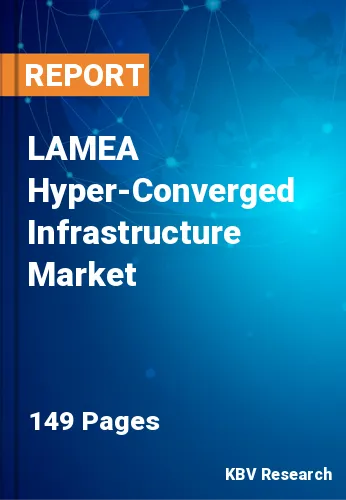The Latin America, Middle East and Africa Hyper-Converged Infrastructure Market would witness market growth of 36.4% CAGR during the forecast period (2019-2025). Hyper-converged technology has gained momentum in the early stages of development because of its ability to provide virtual desktops. With the ever-increasing digital data and diversified sources, companies are moving towards high-performance, alongside a linear scaling architecture that is the primary focus of hyper-converged infrastructure. As the hyper-converged architecture has grown from traditional server workloads such as web servers, regular software, research & development to mission critical workloads such as SAP, SQL, and Oracle, the industry has achieved high adoption rates that influence market growth positively.
A number of key advances have made HCI more suitable for more workloads. One of these is the ability to separately scale compute and storage capacity through a disaggregated model. The other key ability is to create a hyper-converged solution through NVMe, which is an open logical device interface specification to access non-volatile storage media linked via a PCI Express bus- over fabrics.
All Hyper converged and Converged IT infrastructures combine the four elements of the data center. Although hyper converged systems achieve this through software, making it hardware-agnostic, converging solutions rely on hardware. The Converged Infrastructure Data Center uses much of the same products as conventional IT, with simpler architecture and simpler management. In comparison to the purpose-built hardware, all critical data center operations work on a tightly integrated software layer.
Based on Component, the market is segmented into Software and Hardware. Based on Organization Size, the market is segmented into Large Enterprises and Small & Medium Enterprises. Based on Application, the market is segmented into Data Center Consolidation, Virtual Desktop Infrastructure (VDI), Backup/Recovery/Disaster Recovery, Remote Office Branch Office (ROBO), Virtualizing Critical Applications and Others. Based on End User, the market is segmented into BFSI, Telecom & IT, Healthcare, Government, Education, Manufacturing and Others. Based on countries, the market is segmented into Brazil, Argentina, UAE, Saudi Arabia, South Africa, Nigeria, and Rest of LAMEA.
Free Valuable Insights: Hyper-Converged Infrastructure Market in LAMEA is expected to register a CAGR of 36.4% during the forecast period (2019-2025)
The market research report covers the analysis of key stake holders of the market. Key companies profiled in the report include Cisco Systems, Inc., Fujitsu Limited, Dell Technologies, Inc. (VMware, Inc.), Microsoft Corporation, Hewlett Packard Enterprise Company, Huawei Technologies Co., Ltd. (Huawei Investment & Holding Co., Ltd.), NEC Corporation, IBM Corporation, NetApp, Inc., Hitachi, Ltd. (Hitachi Vantara), and Nutanix, Inc.
Market Segmentation:
By Component
By Organization Size
By Application
By End User
By Country
Companies Profiled
Our team of dedicated experts can provide you with attractive expansion opportunities for your business.

